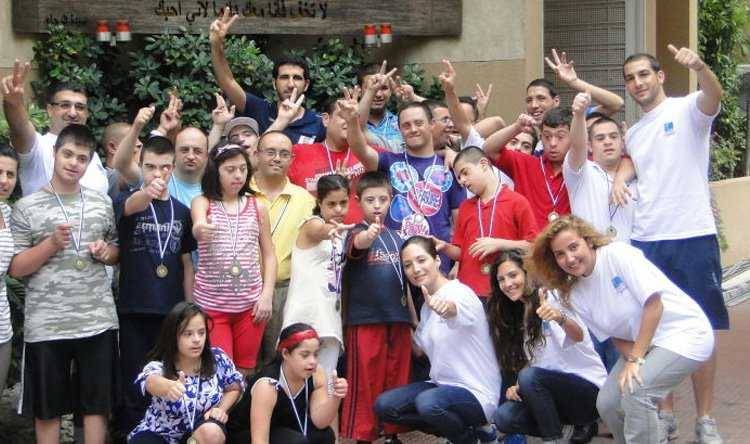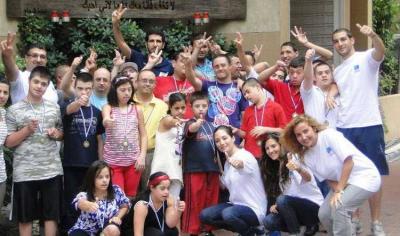The economic and financial crisis threatens many sectors, and institutions are starting to waver under the heavy burdens they bear. There are institutions that cannot be left to die slowly, as their demise means a tragic end for a large number of individuals associated with them. People with disabilities cannot be left to fend for themselves against their fate. The "Cezobell" institution is one of these institutions that is suffering, along with approximately ten thousand individuals with disabilities who require ongoing assistance and care that cannot wait for financial transfers or government and ministerial decisions stuck in the Ministry of Social Affairs or the Central Bank of Lebanon or other banks. Institutions that were born to help are now struggling and need a rescue operation. This is a cry of pain from oppressed hearts.
"We call on all candidates in the parliamentary elections to include the difficulties faced by associations working with disabled individuals and contracted with the Ministry of Social Affairs within the priorities of their electoral projects, and to pledge to respond to the needs of the disability issue in Lebanese society, especially since Lebanon has ratified the international agreement on the rights of persons with disabilities." With these words, the National Federation for Disability Affairs raised its voice on the fourth of this month, shedding light on the suffering of people with disabilities and their families, who are among the threatened groups.
Given the situation, good luck to those who won, after effort and struggle, with the hope that they will pay attention to the tragedy of these individuals within the concerns and priorities of the elected officials. We go directly to "Cezobell." It is one of the associations that suffers the most, despite the support programs, the social safety net, and the financial card. Like others, it is burdened with enormous financial pressures after its funds were trapped in banks, and the low payments made by the Ministry of Social Affairs for rehabilitation and educational services. What is even harsher is the fact that these associations have not received their financial dues since March 2020.
A broad outlook on the current situation of "Cezobell" is sufficient to grasp the tragic scene that encapsulates the suffering of dozens, if not hundreds, of other associations. The near-total absence of the state with most of its agencies is enough to trigger alarms about the fate of thousands of individuals trapped in a loop of unknown outcomes, unless decision-makers quickly address the gravity of the situation.
So, what are the details? "Cezobell," which was established in 1967 to serve individuals with various types of disabilities, from physical and movement to mental, caters to approximately 1400 children and youth from birth up to the age of 55 without any discrimination. Two programs summarize the association's work: the "Comprehensive Intervention Program," which focuses on treating individuals within the center and includes about 400 people; and the "External Services Program," where a group of specialists and therapists follows up on individuals, exceeding a thousand in number, where they are located. Treatments primarily focus on: the "therapeutic medical program," which includes medications, tests, and surgeries, in addition to psychological therapies, psychosocial treatments, and sensory therapies. There is also a program for "social family follow-up" to empower families to maintain their cohesion and care for their other members, as well as to educate them about the condition of the affected child and how to proceed through treatment stages. Furthermore, there is "specialized educational follow-up" and "vocational follow-up" through which the affected individual masters the profession of their choice. The "existential follow-up" is an integral part of treatment, as it answers many questions posed by the affected individual, the most prominent being, "Why me?" This allows them to continue their lives, defying circumstances with hope, joy, and dignity.
"Cezobell" has a main branch in Ain Riyhana that deals with all services, and another branch in the Dourah area where all kinds of treatments are available and families are welcomed for diagnosis of conditions and an explanation of treatment stages. In Jezzine, the association established in 2006 the first school integration center in Lebanon in collaboration with the Ministry of Education, in addition to creating workshops in Kfarhouna to teach trades to those who cannot continue their studies. The staff consists of about 50 doctors from different specializations who provide semi-free services, alongside 225 dedicated employees, including psychologists, speech and language therapists, physiotherapists, and respiratory therapists, in addition to specialized educators and responsible department managers.
To further discuss the association's suffering, "Nada Al-Watan" contacted its president, Ms. Fadia Safi, who pointed out that the echo of the last cry dates back to before 2019 when the Ministry of Social Affairs stopped paying the dues owed to associations. When asked about the ministry's relation to the institution, Safi responded: "There are two types of contracts, either signed directly with the parents or through a disability card issued by the Ministry of Social Affairs, which is responsible for settling dues." It is worth noting that the number of individuals treated at the ministry's expense constitutes two-thirds of the total number of affected persons.
"Cezobell" reached the brink of closure at one point, but due to the love and trust of people in its mission—which translated into donations from inside and outside the country—it managed to stay afloat. To amplify their voice, it united with other associations under the "National Federation for Disability Affairs" in an attempt to urge the concerned parties to take action. The result was that the ministry began to transfer dues, and the situation remained as is until March 2020, where payment operations were suspended again and have not resumed, despite repeated promises to release the owed amounts.
Another dilemma appears to have no solutions in the near horizon. The Central Bank of Lebanon – similar to what depositors in general are facing – imposed restrictions on transfers issued from the Ministry of Social Affairs, placing conditions on withdrawal operations. This money is intended to secure treatments, medications, and specialized education: "They allow us to withdraw 8 million LBP monthly while our salaries amount to 400 million LBP. There are promises as much as you want, but implementation is absent," says Safi.
The crisis of the cost of living allowance, which has not undergone any adjustments by subsequent governments since 2012, poses another obstacle before associations in resisting the "hysteria" of rising prices. “We demand that the government provide a cost of living allowance because the amounts are no longer sufficient to cover expenses. We also requested the formation of a price committee to study the inflation index and set them accordingly, but there has been no response,” Safi adds.
In light of the lack of official response, individual initiatives remain the last hope for confrontation. In this context, Safi explains that, as part of the "cost-cutting" policy, attendance days have been reduced to two days, with three days remote, to limit transportation expenses that have risen to 65,000 LBP daily and may soon reach 100,000 LBP. "Calculating this difference for 225 employees, we are talking about a large sum that we cannot bear anymore. Keep in mind that remote follow-up is not healthy for the affected individual, as they need daily treatments and tests, knowing that 70% of our beneficiaries are classified as having moderate to severe disabilities."
Obstacles do not stop here. More than 48 individuals from the specialized team have submitted their resignations, either due to travel amid their frustration with the country’s condition or joining international organizations and Arab countries where they receive salaries in dollars. "It is difficult to lose an entire committed specialized team after we have educated and trained them, only to have to train new staff again," Safi laments.
Lebanese expatriates, of course, contribute, but the situation is worsening day by day. A difficult question with the fear of a more difficult answer: What if the concerned parties do not respond? “The fate of about 10 thousand beneficiaries from 'Cezobell' and other associations will be jeopardized, and more than two thousand committed individuals will be forced back to their homes, and there will be no hope in saving deteriorating psychological, physical, and mental conditions amid the cessation of treatments and escalation of complications."
The struggles and hardships have not only touched "Cezobell." For nearly a decade, 102 other institutions and associations have banded together into a coalition for associations, organizations, and centers contracted with the Ministry of Social Affairs amid the crisis of decreasing daily allowances for health care in service, social, rehabilitation, and relief institutions for individuals with disabilities and marginalized groups including orphans, widows, the elderly, etc. A union with no structured framework has been established so far, governed by a group of ten directors and officials. For more insights, "Nada Al-Watan" spoke with Dr. Moussa Sharaf Al-Din, president of the National Federation for Mental Disability – whose association counts 38 – and a member of the executive board and spokesperson for the National Federation for Disability Affairs. He clarified that the union's primary goal is to approach the Ministry of Social Affairs, the Ministry of Finance, and the Cabinet to adjust care service fees. "We managed to raise the fee from 4,000 to 19,000 LBP in 2012 based on the inflation index," he stated.
Despite the contract stipulating that the cost index committee meets every March to determine the new general index and subsequently set service fees based on it, the committee has not met since then. The federation has raised its voice and conducted extensive visits to various authorities, including the ministries of labor, social affairs, health, and the presidency and cabinet, yet promises remain verbal.
The biggest disaster, Sharaf Al-Din continues, is the irregularity in the payment of quarterly dues, which is supposed to be settled every three months, due to the structure and complexity of the state's administration. The last transfer of dues occurred in the first quarter of 2020 at a rate of 19,000 LBP, while the daily cost for individuals with disabilities has become around 350,000 LBP.
Sharaf Al-Din emphasized Safi's concerns regarding the impact of the banks freezing the associations' funds, preventing them from paying employee salaries, particularly in the past six months, as it totals an average of between 60 and 70 million LBP monthly for each association. He added, "We have made a significant effort in front of the Central Bank, and they asked us for tables with the names of institutions, account numbers, and names of banks we deal with, as well as the average monthly expenses for each association; the table was raised to the governor, and we received a promise from him to issue a circular to the banks and the mentioned account numbers to release the required monthly amounts. That happened about two weeks ago, but there has been no response."
During a meeting on the fourth of the month, members of the federation's administrative board raised their last call as matters reached a critical point, demanding: First, obligating the government and the Central Bank to release all banking transfers even though they now cover only one-sixth of monthly expenses. Second, government approval of a cost of living advance equivalent to what was approved in the 2022 budget. Third, working to transfer overdue dues, otherwise, associations will be forced to cease operations and displace those whom the state is responsible for caring for, who are the most marginalized groups in society.
Associations are falling one by one. Seven have closed their doors so far, and others are heading toward closure. Approximately 700 individuals with various disabilities have returned to their homes and have been deprived of treatment... and the strings continue to tighten.
Nada Al-Watan - Karen Abd El Nour




